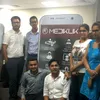Y Combinator-backed medical device startup Inito brings fertility tests to homes
Bengaluru-based Inito helps users monitor their health metrics, suggests proactive lifestyle changes, and puts them in control of their health. Currently focused on fertility, the medical device startup will soon provide tests for other lifestyle diseases.
When Aayush Rai, an IIT-Rourkee alumnus, and Varun AV, an IIT-Madras alumnus, were working at Siemens, they realised that increasing urbanisation and sedentary lifestyles were causing a spike in lifestyle diseases such as heart diseases, thyroid, and infertility.
These diseases necessitate regular monitoring and changes in people’s lifestyles, but the duo felt that going to a lab for regular checkups could be inconvenient and inefficient. This led them to build Inito, a homecare device that can help users monitor their health metrics, suggest proactive lifestyle changes, and put them in control of their health.
Founded in 2015, Bengaluru-based Inito will allow diagnostic tests for vitamins, thyroid, and other lifestyle conditions on a single platform. The device is connected to a smartphone, and analyses the trends of data collected using AI and ML, diagnoses conditions, and suggests remedial lifestyle changes. The first test launched on the device is a fertility test.
“Our vision is to solve the problem of affordable healthcare for the present and coming generations. Right now, fertility tests are available on Inito’s platform,” Aayush says.
The device uses a patented flat-lens technology to enable smartphones to perform real-time, lab-grade fertility diagnostic tests at home. The AI-based app learns from changing hormone patterns to precisely predict cycle variations, diagnose fertility issues, and provide medical guidance unique to every woman’s body.

Founders of Inito
Building the product
Speaking about the technology that allows dozens of diagnostics tests on your phone with the accuracy of lab-grade readers, Aayush says:
“We invented our patented flat-lens technology that allows accurate testing on your phone by a common user. In fact, a study by IIT-Delhi proves that the Inito device has a 99.12 percent correlation to lab devices that are 10x bigger and 100x more expensive.”
He says after the device was launched in 2015 the key challenge has been building trust in consumers. “For that, we conduct third party studies, work with doctors, etc. to prove the effectiveness of our technology. The biggest challenge is that we deal with people's bodies and health. The cost of missing out on even one variable is very high. We can't rely on guesswork; everything needs to be clinically validated.”
Explaining the differentiator as compared to other home ovulation tests, Aayush says Inito measures both estrogen and luteinizing hormone (LH) in urine. It also understands cycle variations to give highly accurate results unique to every individual woman’s cycle, thus increasing the chance of her getting pregnant naturally by 89 percent. He adds that Inito has been specially designed for Indian women and their hormonal patterns.
The patented flat lens allows the camera of your smartphone to detect colour changes on test strips accurately and reliably, which in turn can be mapped to the concentration of the bookmarker.

The Inito Team
How does it work?
On the day you need to take a test, the Inito app automatically sends a notification. The user then needs to dip the test strips in urine and insert them into the reader. On reading the strip, the app gets the value of the hormones LH and E3G in urine, and analyses the trends of these over days to predict each woman's unique fertility rating.
The app, in turn, gives clear, digitised, error-free results for easy interpretation. Inito’s algorithm automatically adapts to the user’s cycles and works even if the cycles are irregular. “Over 150,000 tests have been performed on the Inito device till now by its users," Aayush says.
While the team refused to share the model details, Aayush says they make revenue on every device and strip sale. In the future, users will also be able to take doctor consultations on the Inito app itself.
Aayush adds that the team controls everything from the chemistry tests to the device technology along with data analysis and AI layer.
Different parts of the device are manufactured by different suppliers and the final assembly, quality checks, and approval takes place at Inito’s manufacturing facility. The various parts of the strips are made at various suppliers, and assembled at an ISO-approved contract manufacturer.
“All our vendors are ISO-certified and we work on very strict quality checks,” Aayush says.
The market and future
The startup was backed by Y Combinator in their winter ‘18 cohort. It has so far raised $2 million from Y Combinator and leading angels in India and Singapore.
India’s healthcare industry, one of the country’s fastest growing sectors, is expected to reach $372 billion by 2022, according to the India Brand Equity Foundation (IBEF). The IBEF report says the country has also become “one of the leading destinations for high-end diagnostic services with tremendous capital investment for advanced diagnostic facilities, thus catering to a greater proportion of population”.
Device startups include Kochi-based Bagmo Technologies, which addresses the lack of blood availability that often leads to death during pregnancy in rural India. It has developed a blood bag monitoring device, Bagmo, which monitors the temperature of blood bags during transportation and storage.
There also is Prantae Solutions, a Bhubaneshwar-based biotech startup born out of Founder Sumona Karjee Mishra’s experience of suffering from a pregnancy disorder called pre-eclampsia. The startup develops devices and diagnostic solutions, mainly for pregnancy related healthcare.
Speaking of their future plans, Aayush says, “Right now, Inito’s platform supports fertility testing. Soon we'll be adding eight more hormone tests, which will enable women to test for other fertility issues, including ovulatory cycles, PCOS etc., on the device. Our smartphone connected device has been designed to do up to 30 diagnostic tests on various health conditions; fertility/ovulation is just the starting point. We will expand to other lifestyle diseases after our fertility testing.”
Inito is also eyeing newer markets, like the US, where it is working with the US FDA for compliances.
(Edited by Teja Lele Desai)











